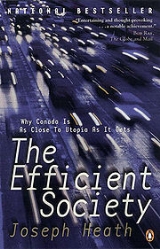
The Efficient Society
Encyclopedia
The Efficient Society: Why Canada is as Close to Utopia as it Gets is a popular book by Canadian
philosopher and author Joseph Heath
. First released in 2001, the book is Heath's attempt to explain why Canada 'works'. He argues that Canada's successes as a nation are largely attributable to its commitment to efficiency
as a value. The book was released to positive reviews, and became a national best-seller.
, Heath argues that a vast of array of social problems are in fact the result of prisoner's dilemmas
and collective action problems. While capitalism as a means of production alleviates many of these (such as shirking), it creates many others. Government intervention in the economy can further help to relieve these collective action problems. Heath argues that the government should operate only in markets where a collective action problem occurs and not in markets where this problem is absent (where it is a race to the bottom not a race to the top).
This is one of the reasons, Heath argues, that the United Nations Annual Human Development Report
consistently ranks Canada as the best place in the world to live.
Canadians throughout their history have shown greater tolerance for government intervention than their American counterparts and Heath argues that it is for this reason that Canada is "as close to utopia as its gets".
Heath also clarifies the book's optimistic title, stating that it is obviously an exaggeration. He claims that "as close to utopia as it gets" may in fact not be very close at all.
Heath also argues that by maintaining physicians on a fee schedule, as opposed to letting the market establish the price of services, the Canadian health care system keeps the amount of gross domestic product spent on health care significantly lower than in the US.
Canada
Canada is a North American country consisting of ten provinces and three territories. Located in the northern part of the continent, it extends from the Atlantic Ocean in the east to the Pacific Ocean in the west, and northward into the Arctic Ocean...
philosopher and author Joseph Heath
Joseph Heath
Joseph Heath is a philosophy professor at the University of Toronto. He also teaches at the School of Public Policy and Governance. He received his BA from McGill University, where his teachers included Charles Taylor, and his MA and PhD degrees are from Northwestern University, where he studied...
. First released in 2001, the book is Heath's attempt to explain why Canada 'works'. He argues that Canada's successes as a nation are largely attributable to its commitment to efficiency
Efficiency (economics)
In economics, the term economic efficiency refers to the use of resources so as to maximize the production of goods and services. An economic system is said to be more efficient than another if it can provide more goods and services for society without using more resources...
as a value. The book was released to positive reviews, and became a national best-seller.
Overview
Drawing on rational choice and game theoryGame theory
Game theory is a mathematical method for analyzing calculated circumstances, such as in games, where a person’s success is based upon the choices of others...
, Heath argues that a vast of array of social problems are in fact the result of prisoner's dilemmas
Prisoner's dilemma
The prisoner’s dilemma is a canonical example of a game, analyzed in game theory that shows why two individuals might not cooperate, even if it appears that it is in their best interest to do so. It was originally framed by Merrill Flood and Melvin Dresher working at RAND in 1950. Albert W...
and collective action problems. While capitalism as a means of production alleviates many of these (such as shirking), it creates many others. Government intervention in the economy can further help to relieve these collective action problems. Heath argues that the government should operate only in markets where a collective action problem occurs and not in markets where this problem is absent (where it is a race to the bottom not a race to the top).
This is one of the reasons, Heath argues, that the United Nations Annual Human Development Report
Human Development Report
The Human Development Report is an annual milestone publication by the Human Development Report Office of the United Nations Development Programme .-History:...
consistently ranks Canada as the best place in the world to live.
Canadians throughout their history have shown greater tolerance for government intervention than their American counterparts and Heath argues that it is for this reason that Canada is "as close to utopia as its gets".
Heath also clarifies the book's optimistic title, stating that it is obviously an exaggeration. He claims that "as close to utopia as it gets" may in fact not be very close at all.
Health care
Comparing health care provision in the United States and Canada (i.e., private versus public insurance schemes), Heath argues that while both systems have inherent problems, the greatest level of well-being with respect to health is to be found in welfare, not market-based, economies.Heath also argues that by maintaining physicians on a fee schedule, as opposed to letting the market establish the price of services, the Canadian health care system keeps the amount of gross domestic product spent on health care significantly lower than in the US.
See also
- The Rebel SellThe Rebel SellThe Rebel Sell: Why the culture can't be jammed is a non-fiction book written by Canadian authors Joseph Heath and Andrew Potter in 2004...
, co-authored by Joseph Heath - Filthy Lucre: Economics for People Who Hate CapitalismFilthy Lucre: Economics for People Who Hate CapitalismFilthy Lucre: Economics for People Who Hate Capitalism is a 2009 book by Joseph Heath.The book is organized around twelve fallacies or myths associated with economics, six of which are common on the left, and six of which are common on the right...

